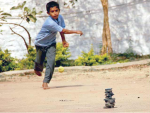Glossary entry (derived from question below)
Urdu term or phrase:
\"پٹّھو گرم\"
English translation:
Seven Stones/ Ball & Stones/ Stack the Stones/ Stack & Throw/ Pithu/Pithu Garam/ Pithu Gol Garam
Added to glossary by
Aliya Furrukh
Nov 23, 2023 09:51
1 yr ago
12 viewers *
Urdu term
"پٹّھو گرم"
Urdu to English
Other
Linguistics
Idiom
Its one of my Childhood game.
چھے، سات کھلاڑیوں کی دو ٹیمز پر مشتمل اس کھیل میں پانچ یا زائد پتھروں کا ایک مینارہ بنایا جاتا ، جسے ٹینس بال کی مدد سےگرانا ہوتا۔ ایک نشانے باز کو تین باریاں میسّر آتی تھیں۔
ایک ٹیم کوشش کرتی کہ پتھر دوبارہ ترتیب دے، تو دوسری ٹیم اُسے مسلسل توڑنے میں لگی رہتی

چھے، سات کھلاڑیوں کی دو ٹیمز پر مشتمل اس کھیل میں پانچ یا زائد پتھروں کا ایک مینارہ بنایا جاتا ، جسے ٹینس بال کی مدد سےگرانا ہوتا۔ ایک نشانے باز کو تین باریاں میسّر آتی تھیں۔
ایک ٹیم کوشش کرتی کہ پتھر دوبارہ ترتیب دے، تو دوسری ٹیم اُسے مسلسل توڑنے میں لگی رہتی

Proposed translations
(English)
| 5 | Seven Stones/ Ball & Stones/ Stack the Stones/ Stack & Throw/ Pithu/Pithu Garam/ Pithu Gol Garam |
Qudsia Lone
|
| 5 | Pitho garam |
noheen Ishaq
|
Proposed translations
3 days 19 hrs
Urdu term (edited):
\"پٹّھو گرم\"
Selected
Seven Stones/ Ball & Stones/ Stack the Stones/ Stack & Throw/ Pithu/Pithu Garam/ Pithu Gol Garam
This Indian game is dated back several thousand years. The term "Seven Stones" is used by Wikipedia which seems literal translation for the Indian name "Satoliya'.
If I were to to translate it I would do as "Stack the Stones" or "Stack and Throw" so it sounds more like a game. But I prefer transliterations since there is no English equivalent of it except the Napalese names are listed as "Ball and Stone" and "Game Ball" in Wikipedia. That sounds like a translation as well though. Also if this game is as ancient as claimed then they probably used something other than a traditional 'ball' for hitting purposes.
Some traditional names are:
a) Dikori
b) Lagoori
c) Lingocha (Hyderabad)
d) Lingorchya (Maharashtra)
e) Pitthu (Haryana)
f) Satoliya (Rajasthan)
g) Satodiya (Gujarat)
h) Yedu Penkulata (Andra Pradesh)
i) Dabba Kali (Kerala)
j) Ezhu Kallu (Tamil Nadu)
If I were to to translate it I would do as "Stack the Stones" or "Stack and Throw" so it sounds more like a game. But I prefer transliterations since there is no English equivalent of it except the Napalese names are listed as "Ball and Stone" and "Game Ball" in Wikipedia. That sounds like a translation as well though. Also if this game is as ancient as claimed then they probably used something other than a traditional 'ball' for hitting purposes.
Some traditional names are:
a) Dikori
b) Lagoori
c) Lingocha (Hyderabad)
d) Lingorchya (Maharashtra)
e) Pitthu (Haryana)
f) Satoliya (Rajasthan)
g) Satodiya (Gujarat)
h) Yedu Penkulata (Andra Pradesh)
i) Dabba Kali (Kerala)
j) Ezhu Kallu (Tamil Nadu)
Reference:
https://en.wikipedia.org/wiki/Seven_stones
https://www.traditionalgamesindia.com/games-list/satoliya-the-seven-stone/
4 KudoZ points awarded for this answer.
Comment: "thanks"
419 days
Pitho garam
Pitho Garam, also known as Seven Stones, is a traditional game cherished in Pakistan, particularly in rural areas. The game involves two teams and requires minimal equipment: a ball and seven flat stones.
Objective: The primary goal is for one team to knock down a tower of seven stones using a ball, then attempt to rebuild it while the opposing team tries to prevent them by hitting players with the ball.
Setup:
Playing Area: A flat, open space free from obstacles.
Stones: Seven flat stones stacked in a tower at the center of the playing area.
Ball: A soft ball, traditionally a tennis ball, used to knock down the stone tower and tag players.
Basic Rules:
Teams: Divide players into two equal teams.
Objective: One team attempts to knock down the stone tower with the ball, while the other team tries to prevent them by hitting players with the ball.
Turns: Teams alternate roles between attacking (knocking down the tower) and defending (preventing the tower from being rebuilt).
Winning: The team that successfully rebuilds the tower without being tagged wins the round.
Pitho Garam is more than just a game; it fosters teamwork, agility, and strategic thinking among players. Its simplicity and minimal equipment requirements make it accessible and enjoyable for people of all ages.



Objective: The primary goal is for one team to knock down a tower of seven stones using a ball, then attempt to rebuild it while the opposing team tries to prevent them by hitting players with the ball.
Setup:
Playing Area: A flat, open space free from obstacles.
Stones: Seven flat stones stacked in a tower at the center of the playing area.
Ball: A soft ball, traditionally a tennis ball, used to knock down the stone tower and tag players.
Basic Rules:
Teams: Divide players into two equal teams.
Objective: One team attempts to knock down the stone tower with the ball, while the other team tries to prevent them by hitting players with the ball.
Turns: Teams alternate roles between attacking (knocking down the tower) and defending (preventing the tower from being rebuilt).
Winning: The team that successfully rebuilds the tower without being tagged wins the round.
Pitho Garam is more than just a game; it fosters teamwork, agility, and strategic thinking among players. Its simplicity and minimal equipment requirements make it accessible and enjoyable for people of all ages.




Discussion